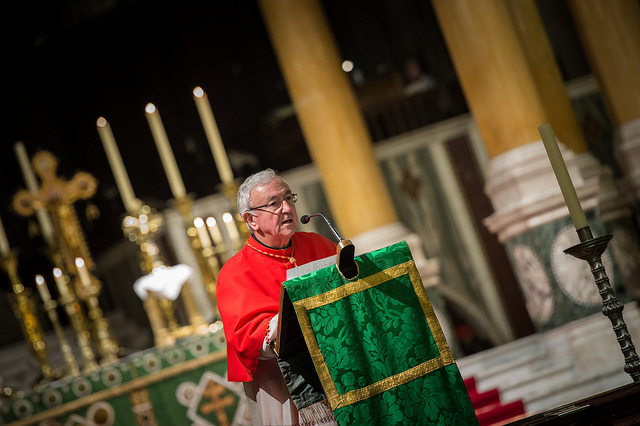The beginning of the Acts of the Apostles is the launch pad of the mission of the Church. In those opening verses we have the account of the Ascension of the Lord into heaven and his mandate and promise to those who know themselves to be his disciples, to go out. That mandate and promise is ratified, its underlined by the appearance of the two angels who say Jesus is gone back to heaven but you now have this task of taking his word and his power and his actions and letting them through you to spread throughout the whole world.
The beginning of the Acts of the Apostles is of course as if it were the second book addressed to Theophilus and so it’s the unfolding of all of the life, the words and actions that the mission of Jesus really meant. And there are two particular points about the moments of the Ascension that I would like to emphasize. The first is that it is the engine room of hope for us who live the Christian life because here the disciples and we with them get a glimpse of what lies before us. We get a glimpse of the glory of heaven, we get a glimpse of the fulfilment for which we have been created and which we want to offer as a vision for people in the world who often live without motivation and without much hope.
What’s interesting is that we don’t have descriptions of what Christ looked like at the moment of his Ascension but we do have some help because in a way we go back to the moment of the Transfiguration because we are told that the three who saw the transfigured Jesus saw him filled with the glory of God. So the Transfiguration complements the account of the Ascension and there as best as they could they describe this radiant figure, this figure of Christ with his garments as shining white and his face full of the glory of God and that spells out a good deal of an image of the hope that lies in front of us all.
But then there is a second moment about the Ascension and about the appearance of the risen Christ which we can bring in here. It comes from the end of St Matthew's Gospel where, in Matthew's account, the disciples meet Jesus at the appointed place and he appears before them and they bow down in worship before him, kneel before him, though then St Matthew encouragingly adds, ‘though some hesitated’ and as we grasp our mission, as we grasp the opportunities to share in the vision and victory of Christ, those few words are good to remember, ‘though some hesitated’.
Because that’s what we have to be ready for. The hesitation in our own hearts, the hesitation in the hearts of those whom we address and we need to be patient, sensitive, reverential towards the hesitation in people’s hearts and not simply wanting to blow it away with our enthusiasm.
So the Ascension of the Lord is the powerhouse of our mission but it’s a powerhouse of mission because it’s a powerhouse of hope and it’s a powerhouse which is sensitive, which wants to engage in a real relationship with those whom we meet and with those with whom we want to share our faith. It’s not a mandate to bully, it’s not a mandate to insist, it’s not a mandate to overpower others. It’s a mandate to walk with them sensitively in the deepest compassion and the deepest reverential understanding of the other who comes as a gift of God.
+ Vincent Nichols




